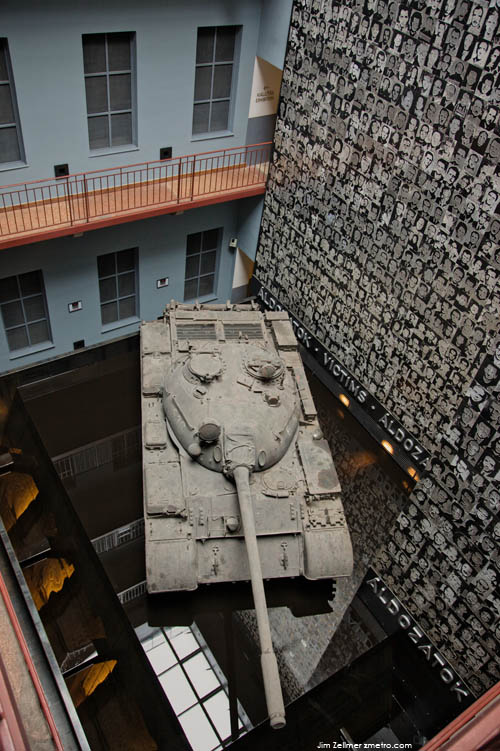We revere Henry Ford: the inventor of modern mass production; the man who put Americans on wheels; the stolid Midwesterner whose ingenuity, common sense and hard work built an empire. Yet this same man was a bundle of contradictions: a pacifist who built tanks and warplanes, and who unleashed frightful brutality against his own striking workers; a hardheaded tycoon who strove to restore a sentimental vision of small-town life. He was, in short, the quintessential American: a hero and a fool.
“Fordism” also became a beacon for the world. Lenin’s Russia, Hitler’s Germany and many poor countries looked to the magic of mass production – and the magic of automobiles – to catapult their way to prosperity. Still, it’s a little surprising that Greg Grandin wants to explain Henry Ford’s America by taking us up the Amazon, where an old-fashioned water tower rises out of the jungle, hinting at a lost utopia.
Grandin, author of “Ford-landia,” has rediscovered one of Ford’s most ambitious but least known ventures. In 1927, Ford obtained a Connecticut-size chunk of the Brazilian jungle. His immediate goal was to establish a rubber plantation to supply his factories’ insatiable demand for tires and gaskets, but he also saw an opportunity to bring Brazil the same blessings that he prided himself on bringing to his Michigan workers: good wages, plus the standards of middle-class propriety that spelled the difference between civilization and chaos.
Category: History
Fireworks
Monona, WI:
Independence Day USA
I had the opportunity to recently visit Budapest’s House of Terror Museum. The museum is housed in a former security services building and provides a powerful reminder of the forces of tyranny. This photo features victim images above a Soviet era tank. 
An appropriate reminder of the price of freedom, today, the Fourth of July, 2009.
An a more pleasant note, Jeff Sullivan posted a gorgeous Yosemite image set here.
It is hard to go wrong at stunning Yosemite! God Bless America.
Washington Post Sells Access to Lobbyists
For $25,000 to $250,000, The Washington Post is offering lobbyists and association executives off-the-record, nonconfrontational access to “those powerful few” — Obama administration officials, members of Congress, and the paper’s own reporters and editors.
The astonishing offer is detailed in a flier circulated Wednesday to a health care lobbyist, who provided it to a reporter because the lobbyist said he feels it’s a conflict for the paper to charge for access to, as the flier says, its “health care reporting and editorial staff.”
The offer — which essentially turns a news organization into a facilitator for private lobbyist-official encounters — is a new sign of the lengths to which news organizations will go to find revenue at a time when most newspapers are struggling for survival.
And it’s a turn of the times that a lobbyist is scolding The Washington Post for its ethical practices.
“Underwriting Opportunity: An evening with the right people can alter the debate,” says the one-page flier. “Underwrite and participate in this intimate and exclusive Washington Post Salon, an off-the-record dinner and discussion at the home of CEO and Publisher Katharine Weymouth. … Bring your organization’s CEO or executive director literally to the table. Interact with key Obama administration and congressional leaders …
“Spirited? Yes. Confrontational? No. The relaxed setting in the home of Katharine Weymouth assures it. What is guaranteed is a collegial evening, with Obama administration officials, Congress members, business leaders, advocacy leaders and other select minds typically on the guest list of 20 or less. …
Read more: http://www.politico.com/news/stories/0709/24441.html#ixzz0K6yNKyHp&C
Related: Helen Thomas.
US vs. Japan: Residential Internet Service Pricing
The following chart lists the price, download and upload speeds of residential Internet services in the U.S. and Japan.
NTT (Nippon Telegraph and Telephone) is the major incumbent telephone operator in Japan. NTT has focused on fiber-optic business while Yahoo! BB (a subsidiary of SoftBank Telecom Corp.) has had first-mover advantage for DSL Internet. Due to unbundling requirements, Yahoo! BB and @nifty provide DSL service by renting NTT’s telephone lines at low prices.
Cable/DSL service
In the U.S., the price for cable or DSL (1Mbps-7 Mbps) ranges from roughly $20-45/month. Comcast has higher speed Internet, 15Mbps-50Mbps, and costs $43-$140 per month.
In Japan, the typical Internet speed is higher than the U.S. (8Mbps-50Mbps), and costs $30-60 per month. J:COM, a large cable Internet provider, has cable Internet up to 160Mbps, costs $63 ($0.4 per megabit).
Who Switched the Playbooks
When I was starting up in China, many experts cautioned me on what I would encounter. “It’s not a free market and there’s no rule of law, they told me. “The government controls the courts, the companies and the banks. Central planners in Beijing, not the marketplace, decide what goods to produce and which companies should produce them.”
“Decisions are made for political, not economic reasons,” they went on to explain. “The heads of China’s state-owned enterprises serve at the pleasure of the Party, the banks are told what loans to make, and making a profit is secondary to ensuring employment. That’s the reason why China’s banks are a mess and full of non-performing loans.”
Occasionally, I would push back, noting the economic progress that China had made since Deng Xiaoping opened the economy in 1978. “You don’t believe the government’s numbers, do you?” they would ask incredulously. “Everyone knows they’re manufactured to convey whatever message the government wants. And, when it comes to financial statements, forget it. Chinese companies have at least three sets of books, and you can’t believe any of them.”
Spy Fired Shot That Changed West Germany
It was called “the shot that changed the republic.”
The killing in 1967 of an unarmed demonstrator by a police officer in West Berlin set off a left-wing protest movement and put conservative West Germany on course to evolve into the progressive country it has become today.
Now a discovery in the archives of the East German secret police, known as the Stasi, has upended Germany’s perception of its postwar history. The killer, Karl-Heinz Kurras, though working for the West Berlin police, was at the time also acting as a Stasi spy for East Germany.
On Manufacturing in China
HE recent scandals about poisoned baby milk, contaminated pet food and dangerous toys from China have raised questions about manufacturing standards in the country that has become factory to the world. In China’s defence, it was probably inevitable that as production grew so would the problems associated with it, at least in the short term. Similarly, it could be argued that China is going through the same quality cycle that occurred during Japan’s post-war development or America’s manufacturing boom in the late 19th century—but in an environment with infinitely more scrutiny.
A response to both these observations can be found in “Poorly Made in China” by Paul Midler, a fluent Chinese speaker who in 2001 moved to China to work as a consultant to the growing numbers of Western companies now replacing factories in Europe and America with subcontracting relationships in the emerging industrial zone surrounding Guangzhou. It was the perfect period to arrive. The normal problems of starting a business, such as getting clients or providing a value proposition, do not hinder Mr Midler, who had the benefit of being in the right place at the right time.
U.S. Blues
The bear market in Treasuries will worsen, because of a glut of government bonds. Instead, consider high-yielding mortgage securities and certain munis. (Video)
We’re talking about U.S. Treasury securities, not housing. At the end of 2008, risk-averse investors poured into Treasuries, driving down yields to the lowest levels in decades. The 30-year Treasury bond fetched less than 3%, and short-term T-bills carried yields of zero.
Since then, the economy has shown signs of bottoming, the credit markets are functioning more normally, and the stock market has roared back from its March lows. Treasuries now are in a bear market, while bullish enthusiasm has taken hold in other parts of the credit market, including corporate bonds, municipals and mortgage securities, all of which had fallen from favor late last year. The 30-year Treasury, for instance, has risen to a yield of 4.10% from 2.82% at the end of 2008, cutting its price by 20%.
Barron’s called a top in Treasuries and a bottom in the rest of the bond market in an early 2009 cover story (“Get Out Now!” Jan. 5). We weren’t alone in recognizing some of the nutty year-end developments. Warren Buffett highlighted the sale in late 2008 by his Berkshire Hathaway of a Treasury bill for a negative yield. Buffett wrote in Berkshire’s annual letter in February that when “the financial history of this decade is written…the Treasury-bond bubble of late 2008” may rank up there with the housing bubble of the early to middle part of the decade. – How does the market look now? Treasuries still look unappealing for several reasons. Yields are very low by historical standards, the government is issuing huge amounts of debt to fund record budget deficits, and the massive federal stimulus program ultimately may lead to much higher inflation.
The Americans in Pyongyang
The first thing our guide Mr. Li said to the people whom he knew had inflicted untold suffering onto his country was “Welcome. I hope you had a good flight.” Then he paused. “We call you the U.S. Imperialists, since you came in and divided our homeland. When some Korean calls you U.S. Bastards or U.S. Imperialists, I will just translate that. I hope that’s okay, I’m just doing my job.”
a
Mr. Li was one of the guides on a tour of Pyongyang in October of 2008, the last month that American tourists were allowed access to the city. I visited as part of a group of 25 Americans, mostly young professionals and students; many said they wanted to see the country before it collapsed under the weight of its own obsolescence. We knew beforehand that our movements would be strictly controlled throughout the tour, and that we were not allowed to wander freely. Our guides showed us the parts of Pyongyang that we were supposed to see. Their filtering the trip was a very valuable way to process information in a place so radically different from anything resembling our definition of normality.